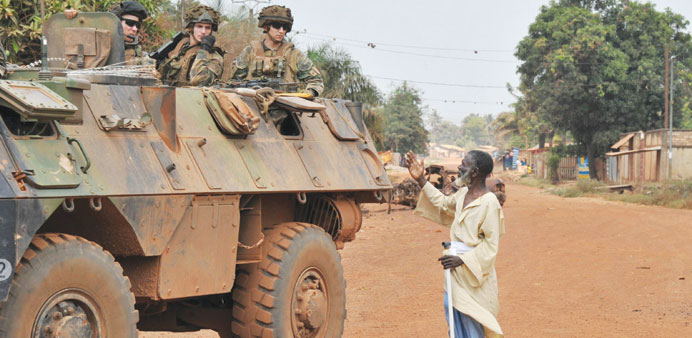|
Gunfire rang out in the capital of the Central African Republic yeterday, heaping pressure on new interim authorities drawing up a strategy to end months of inter-religious bloodshed. |
Sporadic shooting, looting and violence continued in the centre of Bangui, where businesses are mostly Muslim-owned and clashes raged between young Muslims and Christian militia known as “anti-balaka” (anti-machete).
The appointment of new interim President Catherine Samba Panza on Thursday has not quelled the violence and her premier—named Saturday—former banking official Andre Nzapayeke highlighted the urgency facing his new government.
“I’m going to be speaking with the different groups so that we immediately stop certain... atrocities being carried out in this country. We have to put a stop to all that quickly,” Nzapayeke said in an interview with French radio station RFI yesterday.
“There’s a certain number of very clear actions the government is going to tackle starting this week,” he said.
Shots were heard overnight in the capital’s Miskine district, which is patrolled by troops from the 5,200-strong African Union force MISCA and the 1,600-strong French army contingent Sangaris backing them. “When the French are gone they attack us,” said Adam, a resident of Miskine, accusing the anti-balaka of using Sangaris “to advance”.
The French force first intervened in December and set to disarming the former Seleka rebels who had terrorised the country after carrying out a March coup and installing their leader Michel Djotodia, as president.
Djotodia failed to rein in a wave of killing, raping and looting by his former fighters, leading to the emergence of Christian vigilante groups that are accused of committing atrocities of their own against Muslims, including civilian massacres.
French troops ‘allow Seleka to defend themselves’ However the ex-Seleka have accused the French of siding with the anti-balaka by taking their weapons which left them vulnerable when attacked by the Christian militias. French troops have now decided to leave some ex-Seleka fighters the means to defend themselves.
“There are a certain number of Seleka whom we allow to defend themselves,” said Sangaris spokesman Lieutenant-Colonel Thomas Mollard.
New Prime Minister Nzapayeke said he planned to “put a team in place that’s going to deal with the question of national reconciliation”.
“We have to tackle that quickly, it will make the security question easier,” said Nzapayeke, whose surname means “God is present” in the Sango language.
After that, he said, the next step would be helping the one million people who have fled the violence to return home.
Nzapayeke, a former secretary general of the African Development Bank and vice president of the Development Bank of Central African States, said the country would seek help from its “friends in the international community” to end the crisis. Samba Panza, the country’s first woman leader, was elected by the interim parliament to replace Djotodia after he resigned under international pressure on January 10.
She and Nzapayeke are tasked with forming a government to end the bloodshed, restoring the operations of a state whose coffers are empty and whose employees have gone months without pay, and organising general elections by February 2015.
Outside the capital, warlords control large swathes of the country, a land-locked state among the poorest in the world whose history of coups and rebellions since independence from France in 1960 has kept it mired in poverty and instability despite its mining and agricultural potential.

